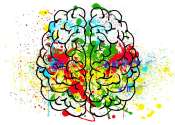Last update:
Neuroscience news
Genetics
Why the human brain matures slower than its primate relatives
The human brain is a fascinating and complex organ that supports numerous sophisticated behaviors and abilities that are observed in no other animal species. For centuries, scientists have been trying to understand what is ...
Dec 26, 2025
0
100
Neuroscience
Alzheimer's disease can be reversed in animal models to achieve full neurological recovery
For over a century, Alzheimer's disease (AD) has been considered irreversible. Consequently, research has focused on disease prevention or slowing, rather than recovery. Despite billions of dollars spent on decades of research, ...
Dec 24, 2025
0
207
Heart-brain connection: International study reveals role of vagus nerve in keeping the heart young
The secret to a healthier and "younger" heart lies in the vagus nerve. A recent study coordinated by the Sant'Anna School of Advanced Studies in Pisa and published in Science Translational Medicine has shown that preserving ...
Dec 24, 2025
0
146

Gut bacteria may play role in bipolar depression by directly influencing brain connectivity
Bipolar disorder (BD) is a psychiatric disorder characterized by extreme mood changes. Individuals diagnosed with BD typically alternate between periods of high energy, euphoria, irritability and/or impulsivity (i.e., manic ...

Brain chemistry can reactivate or suppress dormant HIV
Human immunodeficiency virus (HIV) infections are still fairly common and an estimated 40 million people worldwide are currently living with this condition. The HIV virus attacks the body's immune system and thus makes those ...

Not thinking about anything: Toward a brain signature of mind blanking
When we are awake, we seem to experience a continuous stream of sensations, reflections, memories, and impressions that make up our mental life. Yet some people report moments when they think about nothing at all. Is that ...
Dec 23, 2025
1
67

Visual awareness study unlocks interplay between attention and consciousness
A new study led by Dr. Jiang Yi from the Institute of Psychology of the Chinese Academy of Sciences has revealed the first clear evidence that visual awareness acts as a "conductor" that refines the speed, precision, and ...
Dec 23, 2025
0
103

Humans could have as many as 33 senses
Stuck in front of our screens all day, we often ignore our senses beyond sound and vision. And yet they are always at work. When we're more alert, we feel the rough and smooth surfaces of objects, the stiffness in our shoulders, ...
Dec 23, 2025
1
111

To flexibly organize thought, the brain makes use of space
Our thoughts are specified by our knowledge and plans, yet our cognition can also be fast and flexible in handling new information. How does the well-controlled and yet highly nimble nature of cognition emerge from the brain's ...
Dec 23, 2025
0
80

'Listening in' on the brain's hidden language: Engineered protein detects the faintest incoming signals
Scientists have engineered a protein able to record the incoming chemical signals of brain cells (as opposed to just their outgoing signals). These whisper-quiet incoming messages are the release of the neurotransmitter glutamate, ...
Dec 23, 2025
0
89

Brain's 'pulse generators' grow and shrink as memories are formed, study finds
Memories and learning processes are based on changes in the brain's neuronal connections, and as a result, in signal transmission between neurons.
Dec 23, 2025
0
67

New ALS drug stabilizes decline with a trend toward improved strength and mobility for some
Historically, people with amyotrophic lateral sclerosis (ALS) experience a relentless decline in neurological function that eventually robs them of the ability to move, speak, eat or breathe. Now, researchers from Washington ...
Dec 23, 2025
0
24

Molecular difference in autistic brains may explain signaling imbalance
Yale School of Medicine (YSM) scientists have discovered a molecular difference in the brains of autistic people compared to their neurotypical counterparts.
Dec 23, 2025
0
82

Modified tau thwarts aggregation in neurodegenerative disease—while retaining its biological function
A designer version of the tau protein, developed by a team led by UT Southwestern Medical Center researchers, maintains its biological function while resisting aggregation, a pathological trait linked to neurodegenerative ...
Dec 23, 2025
0
14

Signature neural patterns may help predict recovery from traumatic brain injury
After traumatic brain injury (TBI), some patients may recover completely, while others retain severe disabilities. Accurately evaluating prognosis is challenging in patients on life-sustaining therapy.
Dec 23, 2025
0
49

Nine-gene blood signature and methylene blue offer hope for cerebral malaria
Malaria continues to place a substantial burden on many emerging economies, contributing to significant loss of life, long-term disability, and economic disruption. According to the World Health Organization, the disease ...
Dec 23, 2025
0
0

How age affects recovery from spinal cord injury
A study published in Neurology looks at how age may affect recovery for people with spinal cord injuries. "With population growth and improvements in medicine, the number of people diagnosed with spinal cord injury is increasing ...
Dec 23, 2025
0
1

Why there's always room for dessert—an anatomist explains
You push back from the table after Christmas lunch, full from an excellent feast. You really couldn't manage another bite—except, perhaps, a little bit of pudding. Somehow, no matter how much you've eaten, there always ...
Dec 23, 2025
0
0

Compulsive behaviors may stem from too much (misguided) self-control
A long-held view is that compulsive behaviors involve individuals getting stuck in a "habit loop" that overrides self-control, but new research in rats from the University of Technology Sydney (UTS) suggests this might not ...
Dec 22, 2025
0
99

How brain tumor cells influence neurons and vice versa
Gliomas are cancers that originate directly in the brain, instead of spreading to the brain from other parts of the body. These cancers cannot be cured with conventional cancer treatments, as they spread into healthy brain ...

Clearing the brain of aging cells could aid epilepsy and reduce seizures
Temporal lobe epilepsy, which results in recurring seizures and cognitive dysfunction, is associated with premature aging of brain cells.
Dec 22, 2025
0
66

Key brain cell 'hubs' found to synchronize the body's internal clock
What makes someone a "morning lark" or a "night owl?" Why does jet lag hit us so hard, and why do some people struggle each winter with seasonal affective disorder? Clues to these puzzles may lie in a tiny brain region called ...
Dec 22, 2025
0
67

Exploring why some people tend to persistently make bad choices
When people learn that surrounding visuals and sounds may signify specific choice outcomes, these cues can become guides for decision making. For people with compulsive disorders, addictions, or anxiety, the associations ...
Dec 22, 2025
0
14

Disrupted brain balance in alcohol dependence involves two signaling pathways
A new study by Scripps Research reveals that alcohol dependence disrupts two signaling pathways in a stress-related part of the brain—and offers insights on developing drugs to treat this condition.
Dec 22, 2025
0
0

Brain injuries linked with potential risk of suicide
Adults who experience a head injury face a substantially higher risk of attempting suicide compared to those without such injuries, according to the findings from a new UK-based study.
Dec 22, 2025
0
0












































